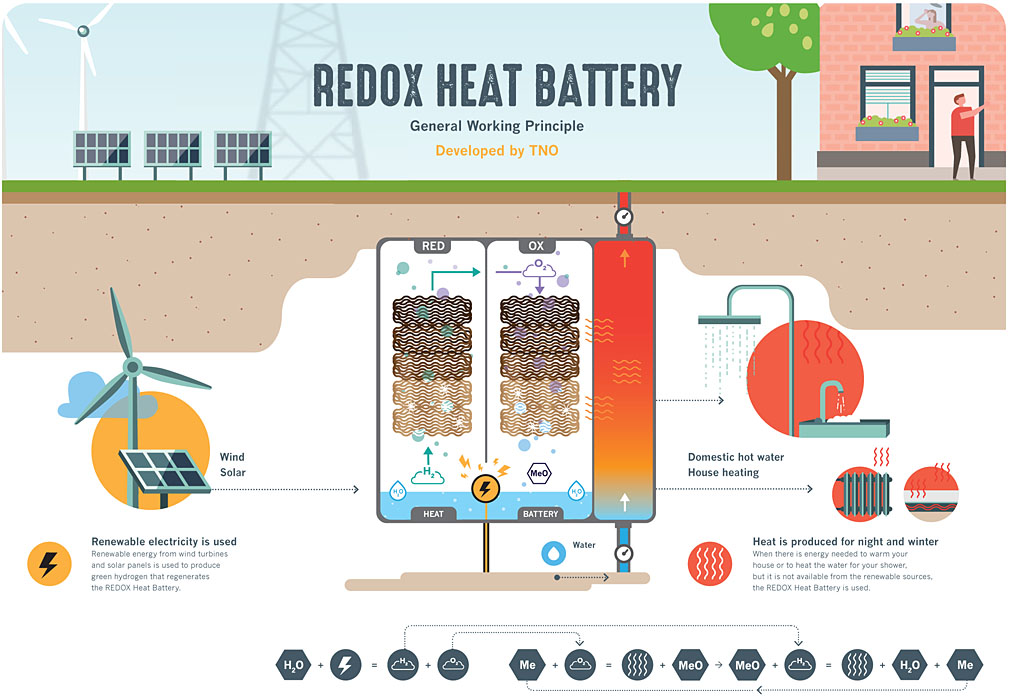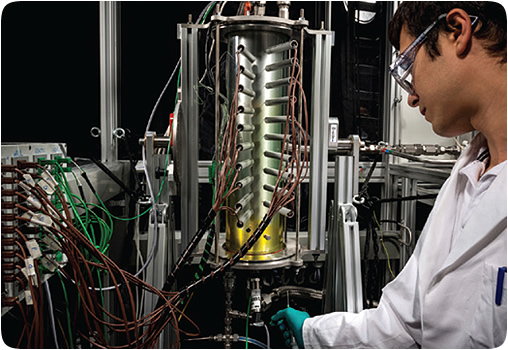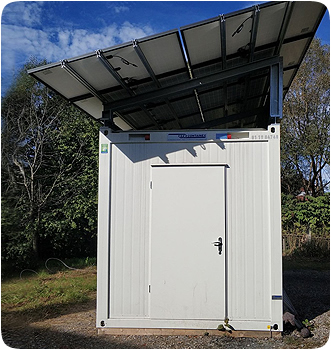The European Commission has set ambitious goals in order to move to an energy-neutral built environment in 2050. This energy transition
imposes major challenges on the building sector and the energy grid.
Increased self-consumption of locally generated renewable energy sources is a must to overcome this challenge. A motivated team of professionals from industry and knowledge institutes has taken on the challenge to develop a hybrid energy storage system that will contribute to this goal.
The SCORES project is a collaborative project supported by the European Commission under the Horizon 2020 programme for Research and Innovation (Call H2020-EEB-2017) with a duration of 48 months.
The project consortium consists of twelve partners from seven European countries and has a strong industrial character (three SMEs and six LEs), complemented by one university and two research and technology organizations, including TNO as a project coordinator.

Fig.1: REDOX heat battery – general working principle (Graphics: TNO)
Tradability and economic benefits
The main aim of the SCORES project is to develop and demonstrate a building energy system including new compact hybrid storage technologies, that optimizes supply, storage and demand of electricity and heat in residential buildings, increasing self-consumption of local renewable energy in residential buildings at the lowest cost and deferring investments in the energy grid.
Combination and optimization of multi-energy generation, storage, and consumption of local renewable energy (electricity and heat) brings new sources of flexibility to the grid and gives options for tradability and economic benefits, enabling reliable operation with a positive business case in Europe's building stock.

Fig.2: REDOX heat battery laboratory setup (Photo: TNO)
Real building demonstrations
Impact of the SCORES system will be a broad assessment covering stakeholders of various economical levels like individual homeowners, housing companies, grid owners, energy companies and governments, ecological issues and also the security of supply /reduced European dependence on fossil fuels originating from unstable countries from across the globe. Within this impact assessment, a first evaluation is performed on two demonstrations. Demonstrations of the integrated hybrid energy system will take place in two real buildings representative of different climate and energy system configurations for three cases, in Central Europe (Austria) with and without a heat grid, and in Middle/Southern Europe (France) without a heat grid.

Fig.3: Test container at Austrian demonstration site (for PV, converter, batteries and BEMS cabinet) (Photo: AEE INTEC)
REDOX heat battery
One of the key technologies to be demonstrated is a Power–to–heat concept developed within the SCORES project. A team of engineers and scientists from the Dutch research organization TNO has built a laboratory scale setup for testing a heat storage technology based on redox reactions of metals - REDOX heat battery as it uses the REDuction and OXidation reactions to store heat.
In the REDOX heat battery the metal core is oxidized using air and the heat generated is used for supplying domestic hot water and space heating. After the reaction, the core is regenerated by supplying hydrogen produced by renewable electricity. This cyclic operation enables the use of this energy storage system similarly as we currently use standard rechargeable batteries at home, with the difference of storing heat rather than electricity. In the course of the SCORES project, the REDOX heat technology will be developed from the current TRL 4 to TRL 6 and demonstrated in a relevant working environment.
Project information:
Project ID: 766464
Website: www.scores-project.eu
Start date: November 2017
Duration: 48 months
Project coordinator: Ing. Peter van Os
Contact email: peter.vanos@tno.nl
Project partners: TNO, AEE-INTEC, CAMPA, EDF, FENIX TNT, FORSEE POWER, HELIOPAC, INSTITUTO POLITECNICO DE SETUBAL, KONIG METALL, RINA-CONSULTING, SIEMENS and STADTWERKE GLEISDORF.
This project has received funding from the European Union's Horizon 2020 research and innovation programme under grant agreement No 766464